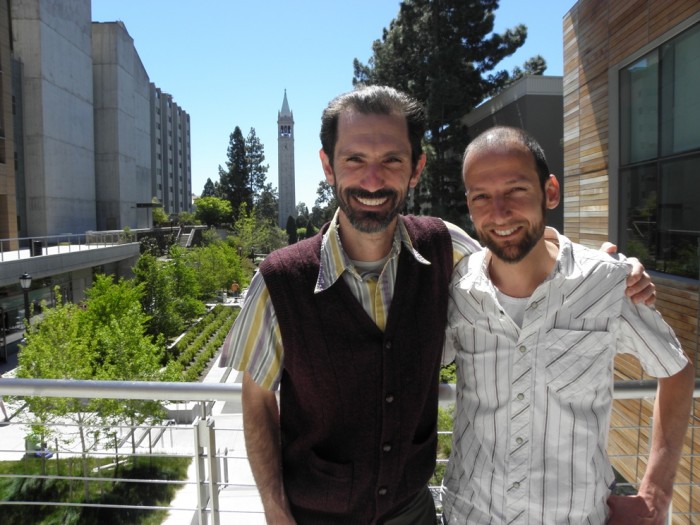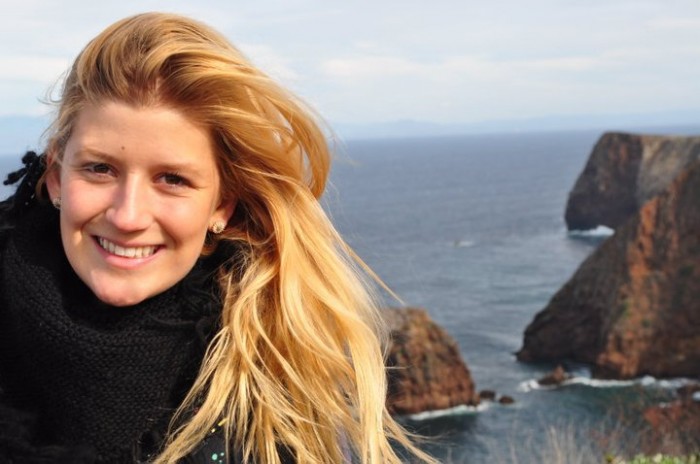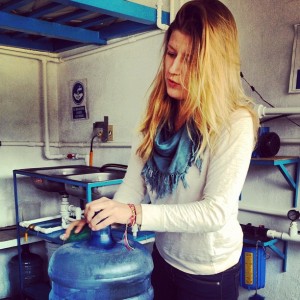New Courses Will Link Scholarship and Community Action

By: Luis Flores and Rachel Voss
April 18, 2013 – Dr. Khalid Kadir, Blum Center Lecturer, and Dr. Sean Burns, Blum Center Director of Student Programs, have been honored as 2014 Chancellor’s Public Scholars by the American Cultures Engaged Scholarship (ACES) Program. Each will design and teach a new course in Spring 2014, emphasizing public scholarship and student engagement in community-based projects. These courses will be cross-listed as enrichment courses in the Blum Center’s Global Poverty and Practice (GPP) Minor.
ACES, a collaborative program between the American Cultures Center and the Cal Corps Public Service Center, aims to transform how community-engaged scholarship is valued on campus. Much like the GPP Minor, ACES seeks to enhance student learning through a combination of teaching and practice, encourage innovative thinking that impacts communities, and transform how the academy approaches ideas relevant to communities in struggle. ACES courses satisfy a campus-wide American Cultures requirement, exposing the entire undergraduate student body to important social histories and issues.
“It is wonderful to have the core faculty of the GPP Minor also actively involved in ACES,” said Dr. Ananya Roy, Education Director at the Blum Center and Professor of City and Regional Planning. “This breaks down the divide between critical poverty studies and practice—often imagined to be concerned with the Global South—and American cultures—often imagined to be concerned with ‘home,’ not ‘elsewhere’.”
Kadir’s and Burns’ awards solidify the Blum Center’s place at the forefront of efforts to transform the relationship between UC Berkeley and the local—and global—community. Working in collaboration with ACES and the Public Service Center, the Blum Center aims to stretch and invigorate Berkeley’s commitment to community-relevant scholarship and impactful community-campus partnerships.
Kadir’s and Burns’ selection follows Blum Center Lecturer Dr. Genevieve Negrón-Gonzales’ participation as a 2013 Chancellor’s Public Scholar. Negrón-Gonzales, whose ACES course focused on “Educational Justice: Undocumented Migrant Students & Struggles around ‘Citizenship’,” has also received the Chancellor’s Service-Learning Leadership Award for her work on this course.
Kadir, who received his PhD in Environmental Engineering at UC Berkeley, first linked social science perspectives with technical problems while writing his dissertation on waste water projects in developing countries. Kadir now teaches a course in the International Areas Studies program on political economy and is a core faculty member in the GPP Minor. Kadir’s new course—among the first ever at UC Berkeley to combine technical and social perspectives with community engagement—sits at the intersection of environmental justice, social justice, and engineering. He hopes it will build engineering students’ understanding of both the possibilities and limitations of technically-based solutions.
“The goal is to help students look beyond the technical orientation of engineering approaches and learn to recognize the ways in which problems that may appear technical are at their roots deeply embedded in social justice,” said Kadir. By partnering with community groups addressing air pollution and soil contamination in Richmond, California, as well as drinking water contamination in unincorporated townships in the Central Valley, Kadir’s course will encourage students to combine interventions with local community engagement. “This class should contribute new scholarship and help shape a cadre of engineers who view problems through a more holistic lens,” he added.
Burns, who holds a PhD from UC Santa Cruz’s History of Consciousness program, published a biography on Bay Area activist Archie Green that was awarded the 2012 CLR James Award for Best Book from the Working Class Studies Association.
Burns’ new course, “Social Movements, Urban Histories, and the Politics of Memory,” examines a range of national and transnational progressive social movements which have had a prominent and influential impact in the San Francisco Bay Area. “The course will not only analyze what others have written and said of these movements, it will also organize community-based documentation projects which seek to expand public understanding of these histories, their legacies, and the contemporary experience of these communities and struggles,” explained Burns.
Making student engagement central to his course, Burns stressed that the class “will encourage students to see themselves as both history makers (people with political agency) and historians (people committed to and skilled in the practice of historical documentation). These skills and sensibilities are essential for engaging in poverty action and, like Khadir’s course, importantly complement the range of work we are taking up in the Global Poverty and Practice Minor.”

